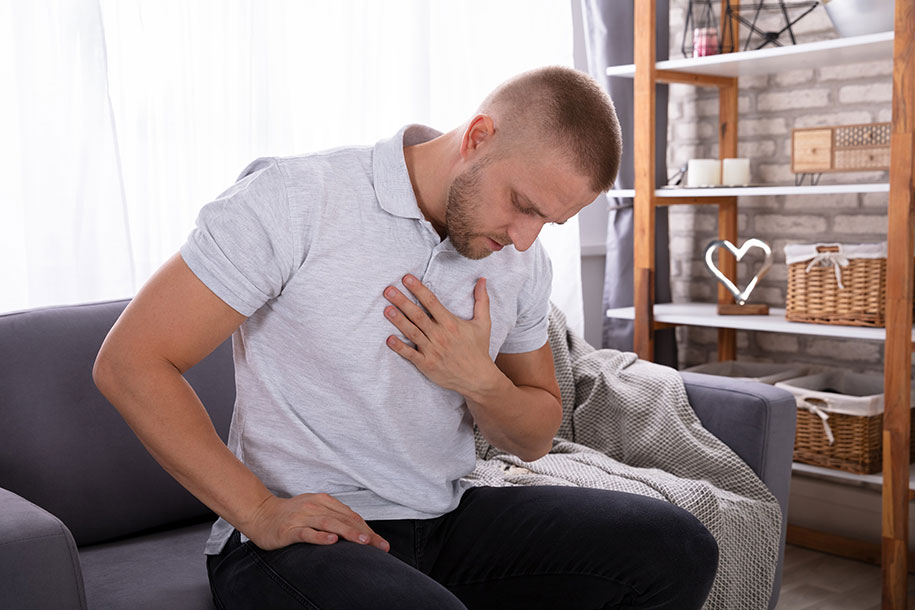Although chest pain is not a serious problem in most cases, we should consult a physician. If we doubt that we have a heart attack, we must receive medical help immediately.
Specifications of the chest pain that the emergency department should immediately contact
If we have a sudden chest pain that:
- Expands the arms, back, neck, or jaw.
- Cause a feeling of pressure or heavy in the chest.
- Along with shortness of breath, sweating, and feeling unhappy.
- Take more than 15 minutes.
It may indicate that we have a heart attack and need immediate treatment in the hospital.
Specifications of chest pain that we should refer to a doctor
- The pain in the chest is alternating (sometimes it comes and goes)
- Chest pain disappears rapidly, but it still has worried us.
It is important to consult a physician to ensure this pain is not serious.
Common causes of chest pain
Chest pain has various causes. The first category is of cardiac or pulmonary origin and threatens life. The second category is caused by heart or lung problems. Since chest pain can indicate a serious problem, seeking an examination and seeing a doctor immediately is necessary.
Causes of chest pain
Examples of the causes of chest pain related to the heart are:
Heart Attack: A heart attack is caused by blocking blood flow to the heart muscle due to a blood clot.
Angina: The pain in the chest caused by poor blood flow to the heart is called angina. This pain is often caused by plaque in the wall of the blood vessels to the heart. These plaques narrow the veins and limit the blood supply to the heart, especially during physical activity.
Curtain Inflammation Includes Heart
: Pericarditis pain is usually severe and worsens when breathing or lying.

Causes of chest pain pulmonary
Examples of pulmonary disorders that can cause chest pain are:
- Blood clotting in the lung vessels: Blood clots in the pulmonary artery can block blood flow to the lung tissue and cause chest pain.
- Inflammation of the lung curtain: Chest pain caused by the inflammation of the lung curtain is worse when breathing or coughing.
Gastrointestinal causes of chest pain
Examples of chest pain caused by gastrointestinal disorders are:
- Refluidity (Reflux): This pain and burning feeling behind the chest bone occurs when stomach acid enters the esophagus.
- Swallowing Disorders: Esophageal disorders can make swallowing difficult and cause pain.
- Gallbladder or pancreatic problems: Stones or inflammation of the gallbladder or pancreas can cause pain that spreads to the chest.
Muscular and bone causes of chest pain
Some types of chest pain are associated with injuries and other problems that affect the constituent structures of the chest wall, including:
- Muscle Pain: Muscle pain associated with chronic pain syndrome, such as fibromyalgia, can cause constant chest pain.
- Damaged ribs: Multiplication gear damage or fracture can cause chest pain.
Chest pain can also be for the following reasons:
- Panic attacks: If we have periods of severe fear with chest pain, rapid heart rate, rapid breathing, excessive sweating, shortness of breath, nausea, dizziness, and fear of death, we may have a panic attack.
- Zona: Zona, which is caused by the reactivation of the smallpox virus, can cause pain and blisters from the back to the chest.
How is the heart’s chest pain?
Chest pain, which is related to heart disease, is felt in many patients with these diseases, not necessarily pain. In general, when chest discomfort is related to attack or heart problems, it may be accompanied by one or more of the following:
- Feeling pressure, dull, burning, or cramping in the chest
- Pressure or severe pain that extends to the waist, neck, jaw, shoulder, and one or both arm
- The pain that lasts more than a few minutes worsens with activity, disappears with rest, and recirculates or varies in intensity again.
- Shortness of breath
- Cold sweating
- Dizziness or weakness
- Nausea or vomiting

How do unnecessary reasons cause chest pain?
It may be challenging to diagnose chest pain from other types. However, chest pain, which is less related to heart problems, is often accompanied by the following:
- Feeling a sour taste or feeling returning food to the mouth
- Problem in swallowing
- Pain that is better or worse by changing body condition
- Pain that is worse by deep breathing or coughing
- Exacerbation of pain when we put pressure on our chest
- The pain that continues for hours
It should be noted that the classic symptoms of heartburn, a painful feeling and burning behind the chest, can be caused by heart or stomach problems. Therefore, we should consult a physician to determine the exact cause of chest pain.
Diagnosis of the cause of chest pain
Chest pain can take many forms, from a sharp, sharp pain to a vague pain. Sometimes, chest pain is felt. In some cases, the pain spreads from the neck to the jaw to the back or bottom of one or both arms.
Although chest pain is not always a sign of a heart attack, in an emergency, the heart attack is usually examined first because it is the most urgent threat to life. The doctor may also examine the causes of life-threatening lung conditions, such as lung embolism. Some of the first studies that your doctor may request when evaluating chest pain are ECG, chest photo, CT scan, and blood test.
Depending on the results of the early tests for chest pain, your doctor may request more tests. These studies may include an echocardiogram (a moving heart check using sound waves), exercise testing, or angiography.
We should remember that chest pain has many possible causes and needs a physician.
